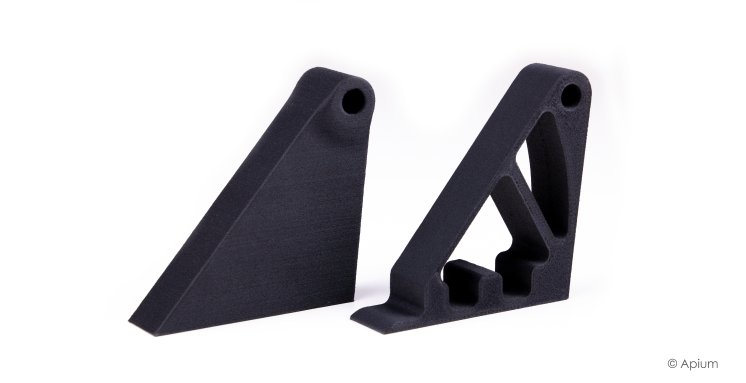In recent times there has been a lot of interest in AM from industrial companies for reasons based on cost and time-to-market. Some of the industrial companies share similar challenges posed by conventional manufacturing methods. Such challenges border on:
- High costs and long delivery lead times for parts with complex geometries and inner channels
- Difficulties in design iteration testing for functional integration of components
- High costs for small quantities or customized production
Rapid prototyping
In dynamic and intelligent process chains of R&D infrastructures conventional manufacturing methods are too static to react on multiple experimental design iterations. In the area of motorsports where the general rule is to have an agile product development strategy, AM technologies such as FFF offers the needed flexibility. Through the ability to fabricate variations of parts and geometries using a single tool user can achieve enormous cost and time savings.
Lightweight production
Considering the fact that PEEK can potentially replace metals in lightweight applications over a range of temperatures (typically -196°C to 260°C) makes Apium PEEK and 3D Print technology interesting for lightweight production. Usage of computer-aided designs, which focus on organic geometries and voided architectures within parts results in less internal stresses as well as reduction in overall mass. The image shown in Fig 1 is a topology optimized bracket manufactured with Apium CFR PEEK, where Apium experts could achieve an overall weight-reduction of 43%.
Production of moulds and tooling
The production of complex injection moulding tools using conventional manufacturing methods can be a very cost-intensive process. In order to attain a break-even point in production especially for batches of small to medium sizes, AM and the Apium P Series offer significant effects:
- Implementing inner structures within mould tools without complex machining results in more effective cooling phases which significantly reduces iterations
- Low cost moulds due to reduction in material loss and same-day lead times
High performance polymeric materials generally show properties which make them uniquely suitable for a diverse range of industrial applications. With this class of materials solutions for specific requirements, needs and functions in industry can be realized. Apium offers a well-matched material portfolio that optimally meets a variety of requirements. End-users can conveniently test the possibilities offered by Material Extrusion (FFF) 3D printing of high-performance polymers and secure a sustainable business advantage.
Learn more specific facts about the applications mentioned in our eGuide: 3 Additive Manufacturing Applications to benefit from High Performance Polymers
Let us talk about how to grow your business with Additive Manufacturing of PEEK, CFR PEEK and other high performance polymers at Rapid.Tech in Erfurt.
Date: 5-7 June, 2018
Booth: 2-707


